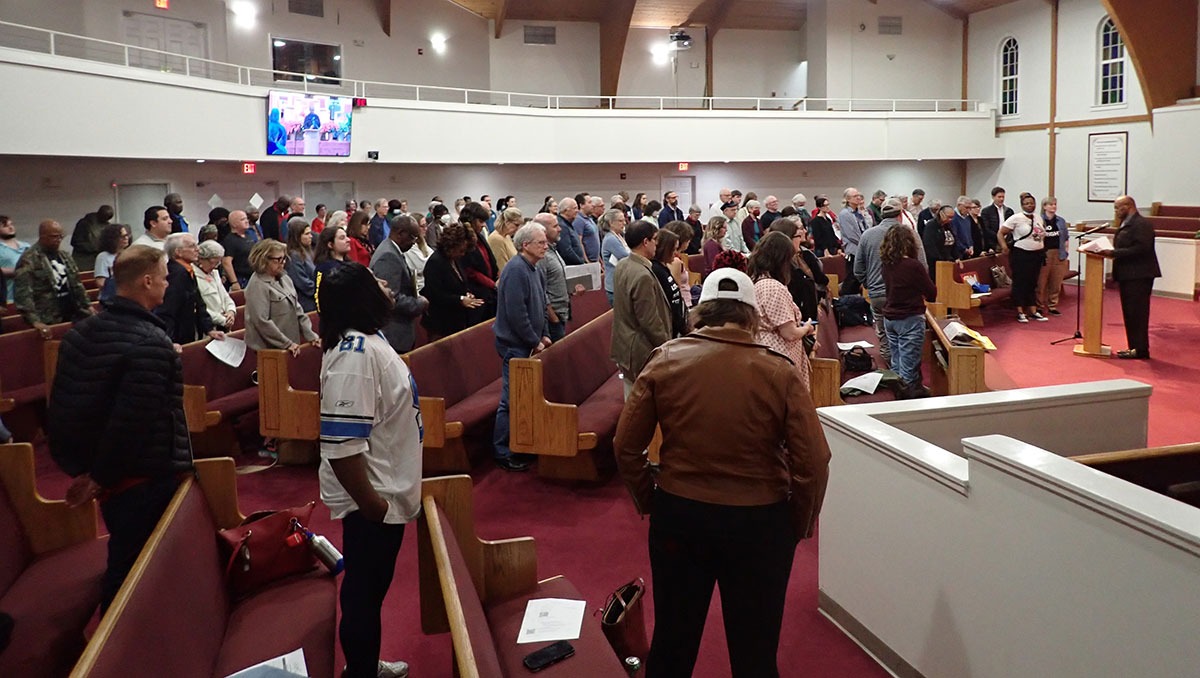By Herb Frazier, Charleston City Paper
The rise of the right-wing extremist group Moms for Liberty has pushed public education even higher among the community concerns for the Charleston Area Justice Ministry (CAJM).
Moms for Liberty’s attempt to control what’s taught in the classroom “has triggered an uptick in engagement in education,” Raynique Syas, CAJM’s co-executive director, said before the group met Monday to launch a new season of research into local problems.
CAJM members recently identified several education-related issues that should be investigated to narrow the list to a few topics that will be brought to the Charleston County School District (CCSD) on April 15 during the group’s annual Nehemiah Action Assembly.
Since the fall of 2012, the group of about 40 racially diverse congregations of all faiths, the College of Charleston and the YWCA of Greater Charleston has pressured elected leaders to break barriers to equality.
These days, the coalition is concerned about the school board’s direction, including potential book-banning, a lack of a challenging curriculum, low teacher pay, retention and fears the board is not representing the interests of minority populations, Syas said.
The school district’s problems, Syas said, stem from a lack of transparency.
“Teachers feel misunderstood by the staff, and the staff feels misunderstood by the board so there is this environment of not communicating effectively,” she told the Charleston City Paper. “So, the students are not academically being challenged, and you see that in their behavior.”
According to a draft of the education committee’s problem statement: “Charleston public schools struggle with an environment of negativity. District leadership is failing to support teachers and schools financially, emotionally, and developmentally. This leads to severe turnover, low staff morale and inadequate resources for the emotional and mental support that students need. This cycle of a lack of support is a driving force behind lowered success rates seen throughout the district.
“The recent actions of the board have led to people having experienced more of a feeling of a lack of transparency despite the work that we have already done to implement restorative practices throughout the district,” she said. “We are continuing to do research to see what are the most effective solutions to newer problems that our network members are expressing toward the district.”
The CCSD response
School district spokesman Andy Pruitt said the district was honored to partner with CAJM over the last year. “We believe its leaders’ voices have been beneficial to students and schools. There is more work to do, and we hope to continue to do it together.
“Do gaps still exist? Yes. Can relationships with our communities improve? Of course. Should we continue to collaborate with and improve conditions for our teachers? Definitely,” he said in an email to the Charleston City Paper. “However, to state we are not challenging students academically or that we are failing to support staff is simply not true.”
School administrators, he said, do not dispute that historically the district has not served all of its communities well. “There are improvements and gains we must make related to student outcomes, teacher retention and support, and equitable resources for all communities,” he explained.
“However, by objective standards, the district is showing progress related to student outcomes” on the SC READY English Language Arts assessment and the state report cards, he said. From 2022 to 2023, the district’s high school graduation rate improved by nearly three percentage points, he said. The percentage of college-bound and career-ready students is also up by more than three points, he said.
He pointed to other improvements including expansion of mental health supports, restorative practices in schools, teacher raises and more planning time for teachers.
CAJM’s research process
The education committee, which is conducting the research, will narrow the concerns to one or more topics, said Rickey Dennis, CAJM’s director of communications. Those topics will be announced during a March 18 rally at Mount Moriah, he said
The following month, CAJM will discuss education issues with the school district’s administration during the Nehemiah assembly. Syas said she did not know whether school board members would also be asked to make a commitment for change. Five of the nine members of the board were backed by Moms for Liberty.
“We won’t know until we get deeper into our research process,” Syas said. “We will be looking for the person or persons who are capable of having the most impactful change.”
The meeting in the chapel at Mount Moriah was the initial step in a research process to uncover winnable solutions to the community problem in the area of education, policing, housing and environmental justice.
CAJM has scored some wins. The group recently secured two mobile units for the Fetter Healthcare Network. Other successes include convincing the school district to add 300 new pre-K slots, and negotiating with the city councils in Charleston and North Charleston to conduct racial bias audits of their police departments. CARTA also has improved public bus transportation services for underserved residents.
CAJM’s face-to-face encounters with elected leaders during past Nehemiah assemblies sometimes created uncomfortable moments for public officials. It also has prompted some conservative CAJM members to leave meetings.
The CAJM process starts with small group meetings in the homes of its members where they list possible areas to investigate.
“Each year education is in our top five on our list of concerns along with housing,” Syas said. “People are worried about their kids, and they are worried about where they are going to live. It is not surprising that we chose education. Public safety and gun violence are also always at the forefront of people’s minds.”
View the original story here.






